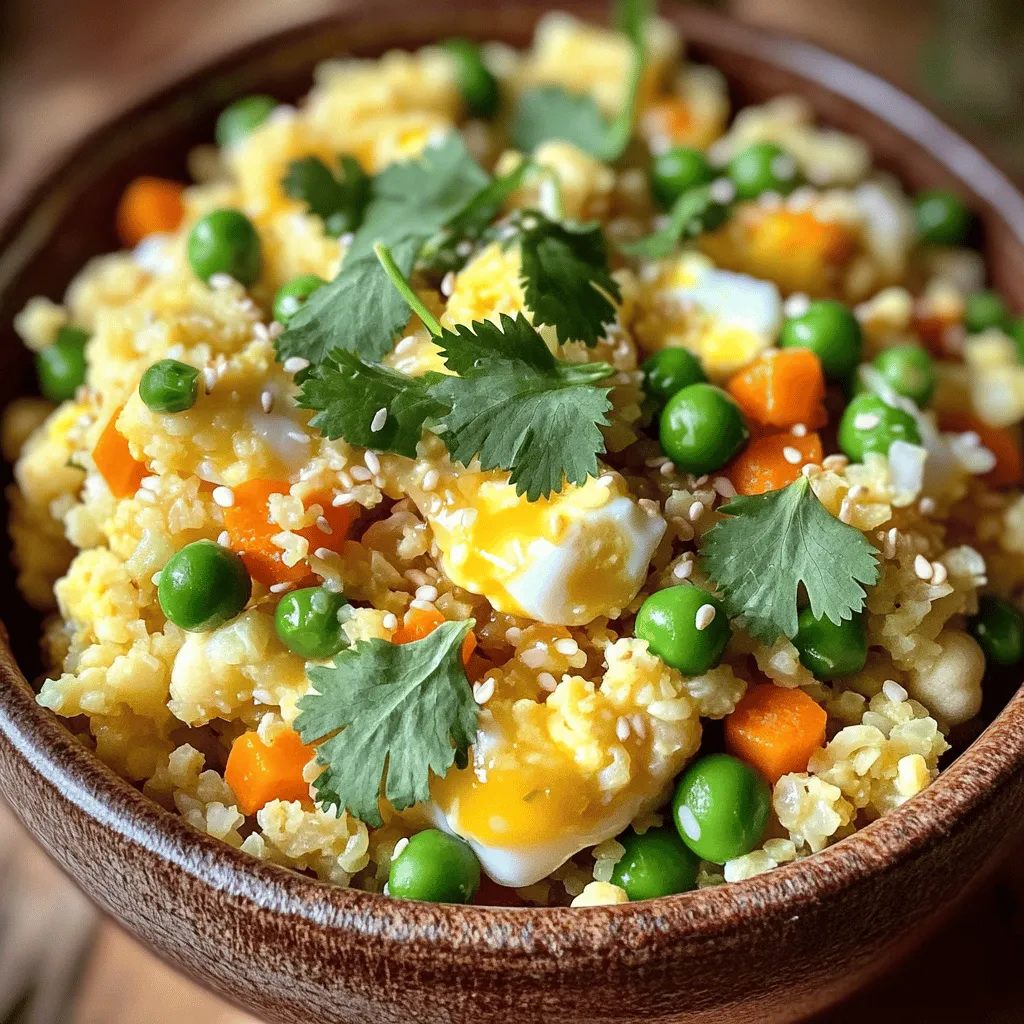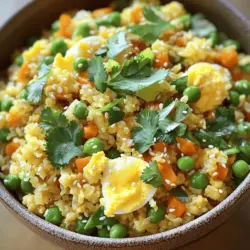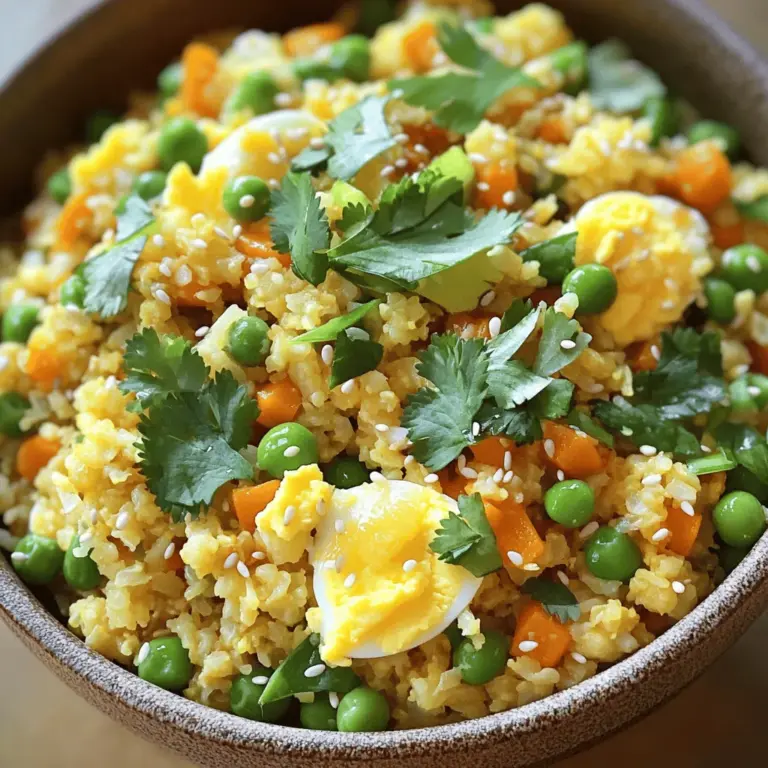Looking for a healthy dish that bursts with flavor? Cauliflower Fried Rice has you covered! This low-carb alternative to traditional fried rice is not only tasty but also packs a nutrient punch. With just a few simple ingredients, you can whip up a quick meal that satisfies your cravings without the guilt. Join me as I guide you through creating this delicious dish step by step, making it perfect for weeknight dinners or meal prep.
Ingredients
List of Ingredients
- 1 medium head of cauliflower, grated or riced
- 2 tablespoons olive oil
- 1 cup frozen peas and carrots mix
- 3 green onions, sliced
- 2 cloves garlic, minced
- 2 eggs, beaten
- 3 tablespoons low-sodium soy sauce (or tamari for gluten-free)
- 1 teaspoon sesame oil
- 1/2 teaspoon ground ginger
- Salt and pepper to taste
- Fresh cilantro for garnish (optional)
Cauliflower fried rice is a simple dish with tasty ingredients. Each one adds flavor and nutrition.
Nutritional Information
A serving of cauliflower fried rice has about 150 calories. It is a low-calorie meal option.
- Macronutrient Breakdown:
- Fat: 7g
- Protein: 8g
- Carbohydrates: 15g
This dish gives you good protein while keeping carbs low.
Potential Health Benefits
Cauliflower fried rice is low-carb and keto-friendly. It helps you stay on track with your diet.
The ingredients are full of vitamins and minerals. Cauliflower is rich in fiber and good for digestion.
Eating this dish can support weight loss while keeping you full. Enjoying cauliflower fried rice means you get to eat healthy and delicious food.
Step-by-Step Instructions
Preparation of Cauliflower Rice
To make cauliflower rice, start with a medium head of cauliflower. Cut off the leaves and stem. Then, break it into smaller florets. Now, here’s the fun part! Use a food processor to pulse the florets. Pulse until they look like rice grains. It should take about 15-20 seconds.
If you don’t have a food processor, you can use a box grater. Just grate the florets until they’re small. Both methods work well, so choose what you like best.
Cooking Instructions
Now, let’s cook! Heat 2 tablespoons of olive oil in a large skillet over medium-high heat. Add 2 cloves of minced garlic and 3 sliced green onions. Sauté these for about 1 minute. You want them to smell yummy but not burn.
Next, toss in 1 cup of frozen peas and carrots. Stir everything well and cook for about 3-4 minutes. You want the veggies heated through.
After that, push the veggies to one side of the skillet. Pour in 2 beaten eggs on the empty side. Scramble the eggs until they look firm. Once done, mix them into the veggies.
Now, stir in your riced cauliflower. Add 3 tablespoons of low-sodium soy sauce, 1 teaspoon of sesame oil, and 1/2 teaspoon of ground ginger. Mix it all together. Cook for another 5-7 minutes. Stir often until the cauliflower is tender but not mushy.
Final Touches
Taste your dish and adjust the seasoning. Add salt and pepper as needed. Once everything is hot and well mixed, it’s ready to serve.
For a fun touch, garnish with fresh cilantro if you want. This adds color and flavor. Enjoy your healthy and tasty cauliflower fried rice!
Tips & Tricks
Cooking Tips
To avoid mushy cauliflower rice, start with fresh cauliflower. Make sure to pulse it until it resembles rice, but do not over-process. Over-processing makes it too watery.
Use a large skillet or wok over medium-high heat. This helps the cauliflower fry quickly. Avoid cooking it too long; five to seven minutes is perfect.
For oils, I recommend using olive oil or avocado oil. Both have high smoke points and great flavors. They help the rice crisp up nicely.
Serving Suggestions
Pair cauliflower fried rice with your favorite protein. Chicken, shrimp, or tofu work well. Cook them separately and serve on top of the rice. This adds extra flavor and makes your meal more filling.
For meal prep, consider making a big batch. Store it in airtight containers. It can last up to four days in the fridge. Reheat portions quickly for a healthy lunch or dinner.
Enhancing Flavor
Adding spices or herbs can boost the taste. Try garlic powder, onion powder, or a pinch of chili flakes for heat. Fresh herbs like cilantro or basil add color and freshness.
Experiment with different sauces to change the flavor. Soy sauce gives it a nice umami taste. You can also try teriyaki, sweet chili, or even sriracha for a kick.Enjoy your cooking!

Variations
Vegetarian and Vegan Options
You can easily make cauliflower fried rice vegetarian or vegan. If you want to skip eggs, use flaxseed or chia seeds. Mix one tablespoon of seeds with three tablespoons of water. Let it sit for a few minutes until it thickens. You can also add tofu or tempeh for extra protein.
Feel free to include a variety of veggies! Try bell peppers, zucchini, or mushrooms. These colorful veggies add taste and crunch. They also boost the dish’s nutrients.
Low-Carb Add-ins
For low-carb options, you can add protein to make it filling. Chicken, shrimp, or beef work great. If you prefer plant-based, use chickpeas or lentils.
You can also switch up the sauces. Instead of soy sauce, try coconut aminos or a spicy sriracha. These sauces can give your dish a new twist.
Flavor Profile Adjustments
Want to change the flavor? Go for a Thai twist! Add lime juice, peanut sauce, or basil. This gives the dish a fresh, bright taste.
For an Asian-inspired flair, try adding sesame seeds and scallions. You can also include bok choy or snap peas for extra crunch. Each variation keeps your meal exciting and delicious.
Storage Info
Refrigeration Guidelines
To store leftovers of cauliflower fried rice, let it cool first. Place it in an airtight container. This keeps the rice fresh and prevents odors. I recommend using glass or BPA-free plastic containers. They seal well and are safe for food.
Freezing Cauliflower Fried Rice
You can freeze cauliflower fried rice if you have extra. Make sure it cools down to room temperature. Then, divide it into portions and place it in freezer bags. Remove as much air as you can. To reheat, simply microwave it for a few minutes. Stir halfway through to heat evenly.
Shelf Life
Cauliflower fried rice lasts about 3 to 5 days in the fridge. Check for signs of spoilage like an off smell or discoloration. If it looks slimy or has mold, toss it out. Eating spoiled food isn’t safe.
FAQs
How do I make cauliflower fried rice?
To make cauliflower fried rice, start with a medium head of cauliflower. Grate or rice it until it looks like rice grains. Heat 2 tablespoons of olive oil in a large skillet. Add minced garlic and sliced green onions, cooking until fragrant. Then, stir in 1 cup of frozen peas and carrots. Cook for about 3-4 minutes. Next, push the veggies to one side of the skillet and scramble 2 beaten eggs. Mix everything together, then add the riced cauliflower. Season with 3 tablespoons of low-sodium soy sauce, 1 teaspoon of sesame oil, and 1/2 teaspoon of ground ginger. Cook for 5-7 minutes until tender. Serve warm, and enjoy this tasty dish.
Can I use fresh cauliflower instead of frozen?
Yes, you can use fresh cauliflower instead of frozen. Fresh cauliflower is often crunchier and has a brighter flavor. When using fresh, just prepare it the same way by grating or ricing it. Frozen cauliflower may be more convenient, as it is prepped and ready to use, but fresh often tastes better. Both options work well in this recipe.
Is cauliflower fried rice healthy?
Cauliflower fried rice is a healthy option. It is low in carbs and rich in fiber. Cauliflower provides vitamins C and K, which support your immune system and bone health. The dish also includes peas and carrots, adding more vitamins and minerals. Using eggs adds protein, making it a balanced meal. Overall, cauliflower fried rice is a great choice for a nutritious dish.
This blog post shared simple steps to make delicious cauliflower fried rice. You learned about the key ingredients, health benefits, and cooking methods. We covered tips to avoid mushy rice and how to store leftovers. Remember, you can get creative with flavors and meal pairings. Whether you want a low-carb option or a tasty vegan dish, this recipe fits many needs. Enjoy your cooking and make it your own!


